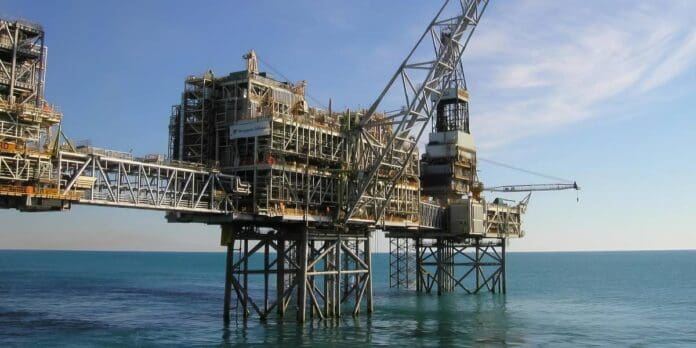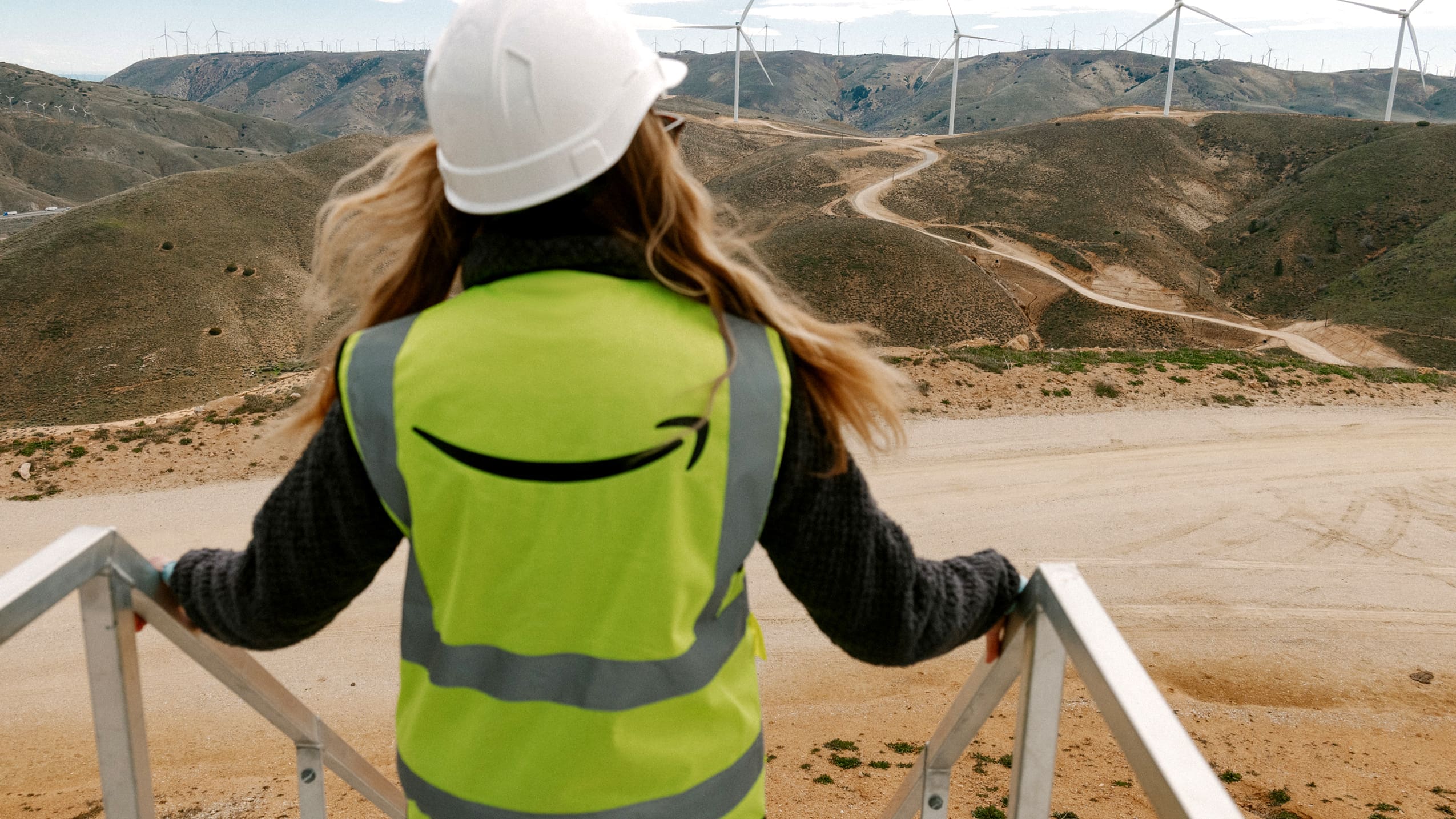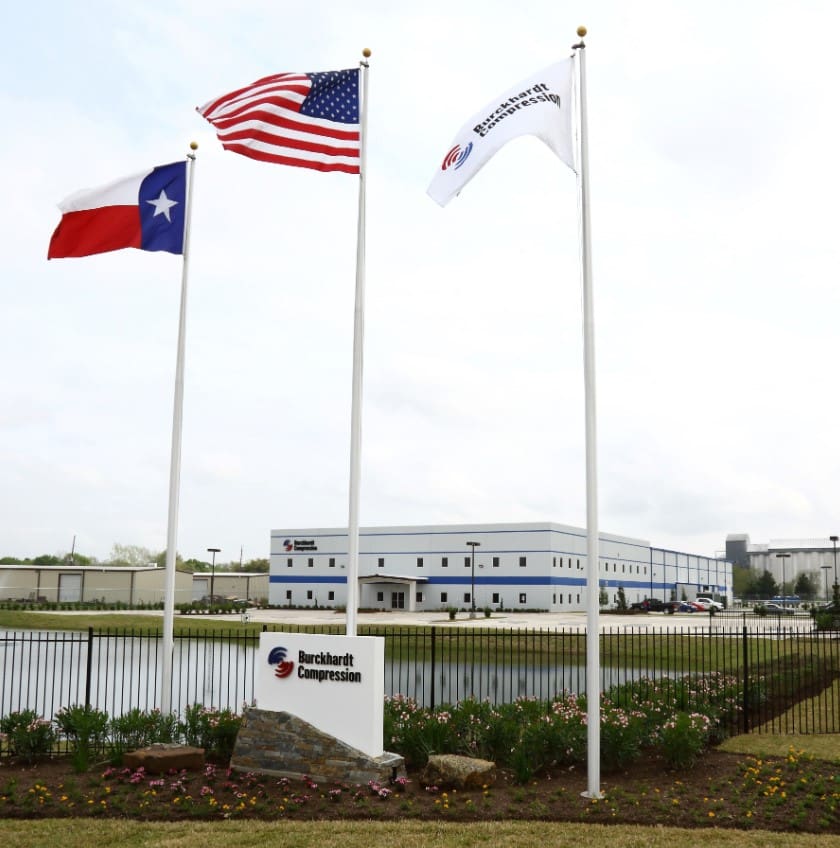Norwegian integrated oil and gas major, Equinor, signed an agreement to acquire Suncor Energy UK (Suncor) for US$850 million. Equinor entered 2023 flush with cash after posting a record revenue of US$149 billion in 2022, record net income of US$28.8 billion, and record free cash flow of US$26.4 billion. “We are building on our longstanding position as a broad energy partner to the UK, strengthening our position as a reliable energy provider in Europe, while continuing to deliver on our ambition of becoming a net-zero company,” said Philippe Mathieu, executive vice president for Equinor Exploration and Production International, in a statement.
In addition to the Suncor deal, Equinor said it expects organic capital expenditures of US$10 billion to US$11 billion in 2023 followed by approximately US$13 billion per year from 2024 to 2026. Despite this spending, Equinor said it only expects oil and gas production to grow by 3% in 2023 compared to 2022 as it continues to invest in low-carbon alternatives and renewable energy to cut greenhouse gas emissions by 50% by 2030.
Details Of The Suncor Deal
The two main jewels in Suncor’s crown were its 29.89% non-operating interest in the Buzzard Oil Field (Buzzard) and a 40% operated interest in the Rosebank Development (Rosebank). Buzzard is located northeast off the coast of Aberdeen, Scotland, while Rosebank is located 81 miles (130 km) west of the Shetland archipelago on the UK continental shelf and about 124 miles (200 km) southeast of the Faroe Islands.
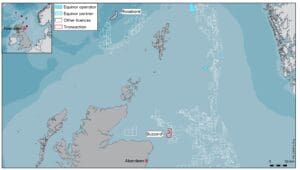
Buzzard is operated by Canadian oil and gas giant CNOOC. It consists of four fixed platforms and three subsea manifolds. Equinor said the field is producing about 60,000 barrels of oil equivalent per day (boe/d). The Forties Pipeline System exports liquids to the Hound Point Terminal where crude is sold on the open market. The FUKA system, one of the main natural gas transportation and processing networks in the North Sea, exports gas volumes from Buzzard. Equinor said there is an electrification initiative to reduce carbon dioxide (CO2) emissions at Buzzard.
Equinor acquired operatorship of Rosebank in 2019 and holds a 40% equity stake, which will increase to 80% once the Suncor deal goes through. Ithaca Energy holds the other 20%. Rosebank fits Equinor’s strategic initiative to boost shareholder returns while also lowering emissions across its oil and gas portfolio. Rosebank has yet to begin production because Equinor has spent years optimizing the development to achieve a low-emissions profile when it comes on stream. A key pillar of Equinor’s decarbonization strategy is sustained natural gas production at a low fixed cost through continued returns from mature plays. The best way to prolong a mature play is to outfit it for the future. Equinor is thinking decades ahead with Rosebank by preparing for a floating production storage and offloading (FPSO) vessel that will take production from the field through subsea wells for processing and offloading.
In January, Aker Solutions (Aker) won the Rosebank Petrojarl Knarr FPSO contract from Altera Infrastructure. In a joint venture with Drydocks World-Dubai, Aker will upgrade the FPSO so it can be kept in the field for another 25 years without drydocking. Aker said the engineering, procurement, and construction work is planned to start up during the first half of 2023. It is scheduled to be completed by the end of 2025. The Petrojarl Knarr FPSO was transported to Aker’s yard at Stord, Norway, in August 2022, and it will be kept there until the planned tow to Dubai during the second half of 2023.
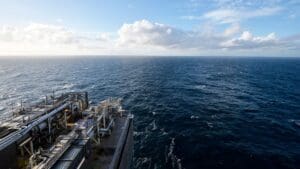
Steps are being taken to prepare Rosebank for additional low-carbon investments down the road. For example, Equinor said the FPSO will be ready for future electrification, which is in line with the North Sea Transition Deal (NSTD). Launched in March 2021, NSTD is focused on transitioning the North Sea to net-zero emissions by 2050 through investments in hydrogen production; carbon capture, utilization, and storage (CCUS); offshore wind; and decommissioning. UK public and private investment is estimated to be US$19.2 billion by 2030, including US$3.6 billion specifically toward CCUS. According to the International Energy Agency, the deal is expected to cut pollution by up to 66.1 million tons (60 million tonnes) by 2030, including 16.5 million tons (15 million tonnes) from oil and gas production on the UK Continental Shelf, while supporting up to 40,000 jobs across the supply chain.
Additional Investments
Equinor’s announcement to buy Suncor came just days after the company signed an agreement with Wellesley Petroleum AS (Wellesley) to acquire equity interests in five discoveries in the Troll, Fram, and Kvitebjørn area in the North Sea on the Norwegian continental shelf (NCS).
| Oil And Gas Field | Equity Stake Before Transaction | Equity Stake After Transaction | License |
| Toppand | 50% | 95% | PL630/PL630CS |
| Grosbeak | 40% | 85% | PL925 |
| Atlantis | 40% | 80% | PL878/878B/878C |
| Røver Nord/Sør
|
40% | 60% | PL923/PL923B |
| Grosbeak | 40% | 55% | PL248I |
(Data Source: Equinor)
Equinor said it has made seven discoveries in the region since 2019. The area is one of the more mature parts of the North Sea. However, Equinor has spent decades lowering its cost of production across the North Sea and currently sports one of the lowest costs of production of the integrated oil and gas majors thanks to NCS and Equinor’s specialty in offshore exploration and production. “With this transaction, we strengthen our position in one of our core areas on the Norwegian continental shelf,” said Kjetil Hove, Equinor’s executive vice president for Norwegian Exploration and Production, in a statement. “These discoveries can be put into production with low costs and low CO2 emissions by being connected to the suitable infrastructure in the area. Discoveries close to infrastructure are important for our ambition to maintain production at current levels from the NCS beyond 2030.”



